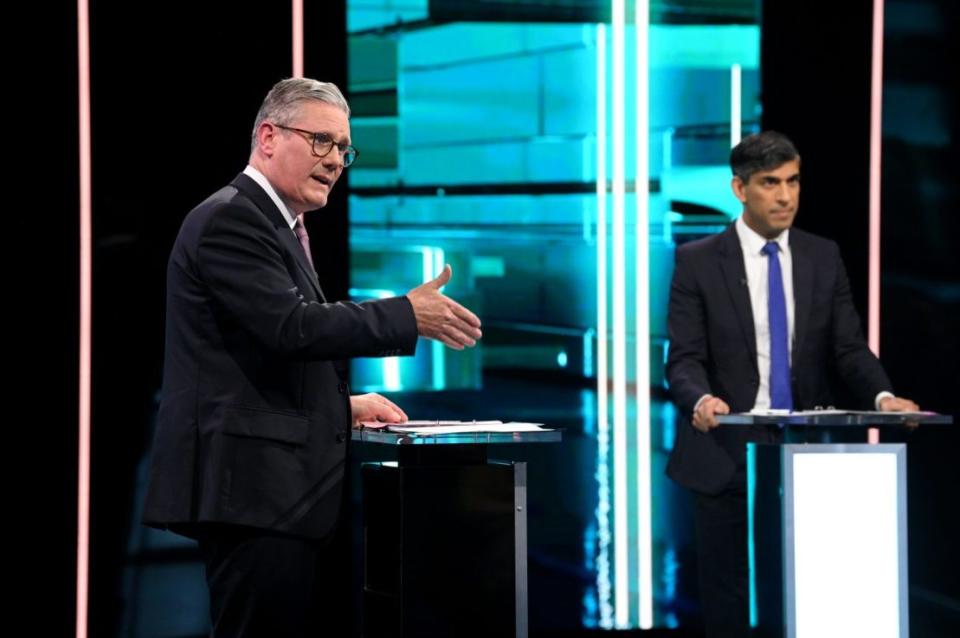Election 2024: Where and how to watch the general election results

Election night at 10pm tends to be one of the most watched television moments of the year.
Traditionally the time when news anchors across the UK’s biggest broadcasters announce the results of the exit poll, which asks thousands of voters in pivotal seats which way they voted, the moment is the climax of invariably long, winding election campaigns.
In 2019, over six million people tuned in to watch Huw Edwards – then the BBC’s main election anchor – reveal pollsters’ prediction that the Conservatives would win 368 seats; just three seats off the final 365.
Yet the momentous readout is just a small part of hours of broadcasting that the main news channels fill throughout the course of election night – and the following day – filled with polling analysis, political punditry, viral moments and, of course plenty of coffee, energy drinks and sugar.
Electoral law prohibits any broadcasts or coverage relating to the election while polls are open, meaning almost all programmes start at 10pm with the exit poll, or shortly before.
But with so many different channels across radio and television offering a wide variety of coverage, here’s a rundown of which outlet is doing what this election night.
BBC
This year will be just the second time that the hosting duties do not fall to broadcasting titan David Dimbleby, who was in the hot seat for nearly four decades’ worth of elections before standing down after the 2017 election.
After the controversy surrounding 2019 host Huw Edwards, there was much speculation as to who would take on the hallowed slot.
In May, the BBC confirmed that News at 10 anchor Clive Myrie and former political editor Laura Kuenssberg would share hosting duties, with regular input from – among others – Jeremy Vine, pollster Professor Sir John Curtice, and Kuenssberg’s successor Chris Mason.
The national broadcaster is also set to air dedicated results programmes in Scotland, Northern Ireland and Wales, while the radio programming will be looked after by Today programme host Nick Robinson and Rachel Burden.
Vine will be in charge of the election mainstay ‘the swingometer’, and the exit poll will be projected onto the front of the BBC’s Old Broadcasting House HQ, the organisation has confirmed.
Channel 4 News
In 2019, Channel 4 News (C4) lost half its audience to other broadcasters and so has pulled out all the stop’s for this year’s vote with a star-studded line up.
The channel was the first of all the main broadcasters to reveal the main details of its coverage, and has signed up podcast supremos Rory Stewart and Alastair Campbell to provide ongoing punditry alongside hosts Krishnan Guru-Murthy and Emily Maitlis.
The Channel’s news team, which many view as having a metropolitan slant, has also snapped up former Tory chancellors Kwasi Kwarteng and Nadhim Zahawi, as well as Labour and Lib Dem grandees Vince Cable and Harriet Harman.
Adding a bit of jollity (and cynicism) to affairs will be the cast of Gogglebox, who will provide exclusively commissioned inserts and interventions.
And in an even more unexpected move, Nadine Dorries will be joining the line up as a pundit, despite trying to privatise the channel during her stint as culture secretary.
ITV
Fresh off the back of his controversial comments about the lack of white male representation among TV news anchors ITV veteran Tom Bradby will host the channel’s coverage for the night.
The channel has opted for a similar approach to Channel 4, drafting in the podcast double act George Osborne and Ed Balls, who also occasionally hosts Good Morning Britain.
Controversially, the team will be joined by the former First Minister of Scotland Nicola Sturgeon, despite her recent arrest – and subsequent release – in connection with a police investigation into the SNP’s finances.
The election programme will draw to a close at 6am, when Balls will return alongside Susanna Reid for Good Morning Britain, where the hosts and guests including Gordon Brown and Guto Harri will comb through the remaining results.
Times Radio
Since launching in the pandemic four years ago, Times Radio has cemented itself as one of the UK’s most respected – and most listened to — current affairs radio channels.
This election campaign the digital radio channel has rebranded itself as “the election station”, doubling down on its political output with new hire Andrew Neil and its dedicated podcast How to Win an Election, which features Danny Finkelstein, Peter Mandelson and former Lib Dem policy director Polly Mackenzie.
Its unsurprising, therefore, that the channel has got a smorgasbord of electoral coverage, promising 100 hours of continuous broadcasting devoted purely to the race for Downing St.
Starting at 9 55pm, mid-morning host of Politics Without the Boring Bits Matt Chorley will lead on the coverage, alongside the channel’s political editor Kate McCann, former Labour special adviser Ayesha Hazarika and new arrival Andrew Neil.
Over the course of the hours of coverage, Chorley will record two separate live podcast episodes of How to Win an Election with the regular guests.
GB News
Anchors Camilla Tominey and Stephen Dixon will be at the helm of GB News’s election coverage, which, like Times Radio, kicks off at 9 55pm.
Unlike Times Radio, however, it looks as if the channel will be putting its viewers at the heart of their coverage, promising “integral” reactions from the GB News audience throughout the night.
Also on hand will be new political editor Christopher Hope and presenter and ex-Labour MP Gloria Del Piero, while presenter Tom Harwood and pollster Professor Matthew Goodwin will be responsible for the number crunching.
The channel will have an interesting tonal balance to tread, after a poll found Labour to have a 13-point lead among its viewers, despite the channel’s “anti-woke” and explicitly right wing commentary output.

 Yahoo Finance
Yahoo Finance 